


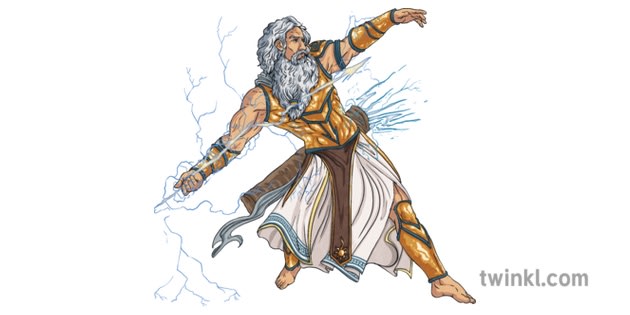
He is respected as an all-father figure in the ancient Greek religion, and has been equated with many other gods in ancient religions, such as Jupiter. In the myths of the Ancient Greek religion, Zeus was the child of Cronus and Rhea, and in most version of the myth he is married to Hera, but he is also known to have other wives and consorts. Zeus has lots of children, many of whom are also gods, goddesses, or heroes.
Zeus is often depicted by ancient Greek artists as being in one of three poses: standing, walking forward holding a thunderbolt, or sitting on a majestic throne. Zeus plays an important role in many stories from the Ancient Greek religion.
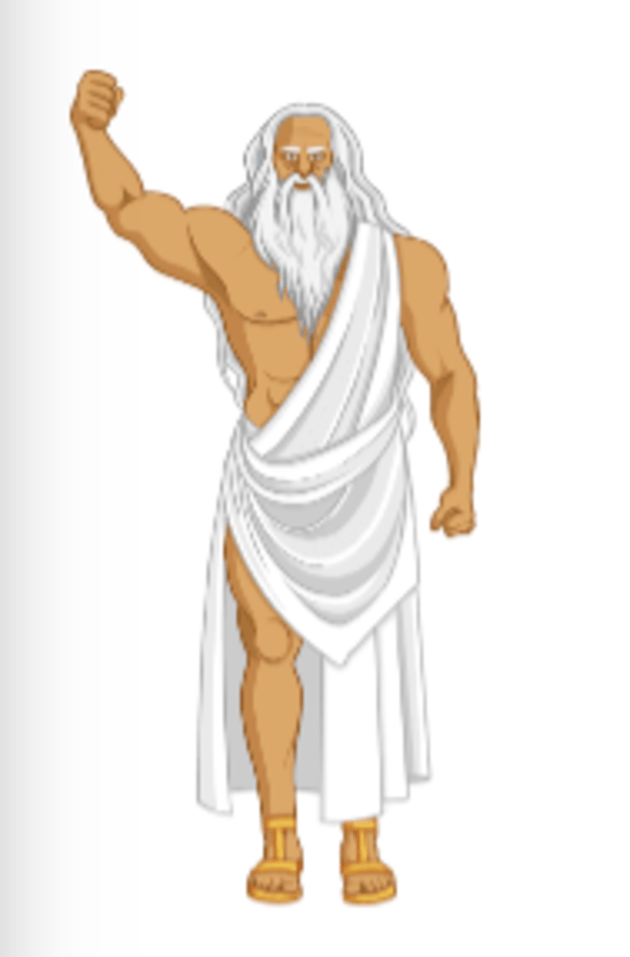 According to ancient Greek myth, Zeus was the sixth child of Cronus and Rhea. Cronus had attempted to swallow Zeus as a baby, because a prophecy said that Cronus would be overthrown by one of his own children, just as he had overthrown his father Uranus.
According to ancient Greek myth, Zeus was the sixth child of Cronus and Rhea. Cronus had attempted to swallow Zeus as a baby, because a prophecy said that Cronus would be overthrown by one of his own children, just as he had overthrown his father Uranus.
The baby Zeus was saved by his mother, who instead gave Cronus a rock wrapped in swaddling clothes to eat, and Zeus was raised by nymphs. When he reached manhood, he was able to save his five siblings by overthrowing his father, and he also freed the Cyclopes, who gave Zeus his thunderbolt out of gratitude.
Following this, Zeus then led the Olympians in a war against the Titans, which lasted for ten years and was known as the Titanomachy. Zeus and the Olympians were eventually able to defeat the Titans, and they were banished to Tartarus. Zeus then became king of the cosmos.
Zeus faced several challenges during his rule as king of the gods, including giants and monsters. There are also some stories in the Ancient Greek religion that depict infighting between the gods, but some of these stories contradict each other.
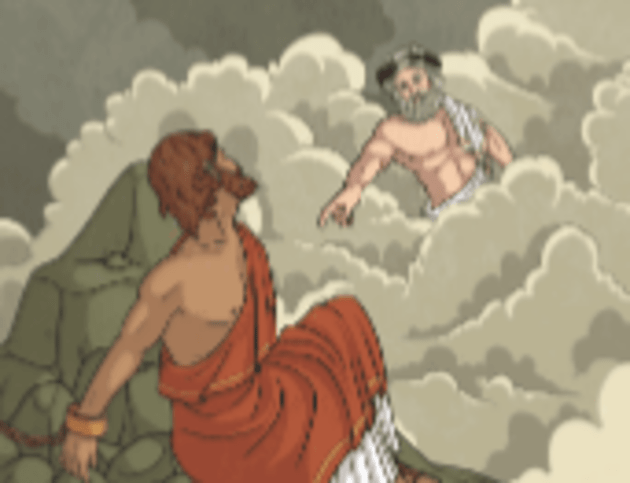 Zeus also came into conflict with humans, such as when Prometheus deceived Zeus into giving more to humans, so Zeus in turn banned human use of fire. Prometheus then stole fire from Olympus and gave it to humans, which further angered Zeus.
Zeus also came into conflict with humans, such as when Prometheus deceived Zeus into giving more to humans, so Zeus in turn banned human use of fire. Prometheus then stole fire from Olympus and gave it to humans, which further angered Zeus.
Zeus plays a guiding role in many Ancient Greek myths, often aiding the heroes against monsters and other forces. However, there are some myths in which Zeus takes the role of antagonist, as the characters in the story are attempting to escape a punishment that he has enacted on mankind.
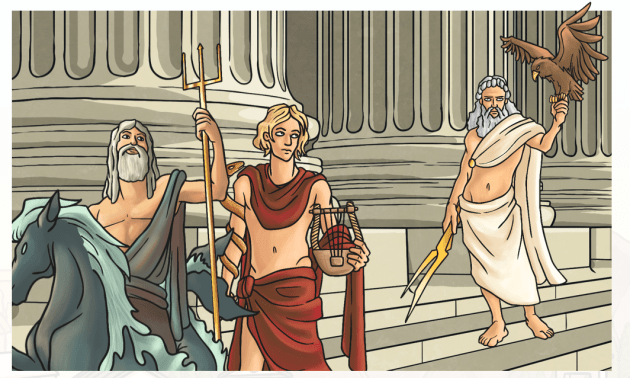
There are several aspects of Zeus' story in ancient Greek mythology which mirror stories seen in other cultures' creation myths. For example, Zeus creates the first woman after the first man, and he also sends a great flood to destroy humankind when he becomes angry with them.
Zeus has many powers, in fact, he is considered to be among the most powerful of all the ancient Greek gods. His most prominent power is his thunderbolt, which he has the ability to throw. Zeus has a winged horse named Pegasus who carries the lightning bolts, and a trained eagle that retrieves them.
As the god of thunder, Zeus also has the ability to control the weather in the ancient Greek myths. He can cause rain, clouds and huge storms, including thunder and lightning. In addition to this Zeus, has the ability to control the movement of the stars, the motion of day and night, and even control time.
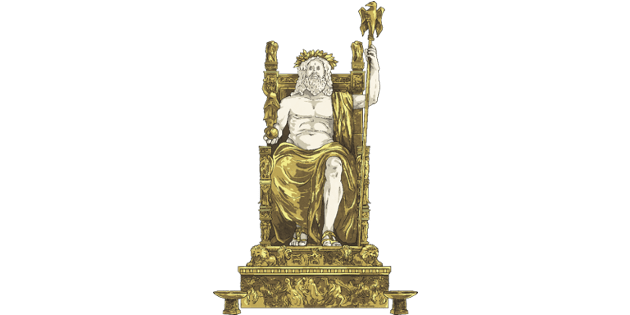
Zeus is the strongest of the gods in the Ancient Greek religion because he has both power and intelligence. He is able to ensure that he is not replaced by another, more powerful deity. He is also able to ensure the allegiance of many other gods by giving them rights and privileges.
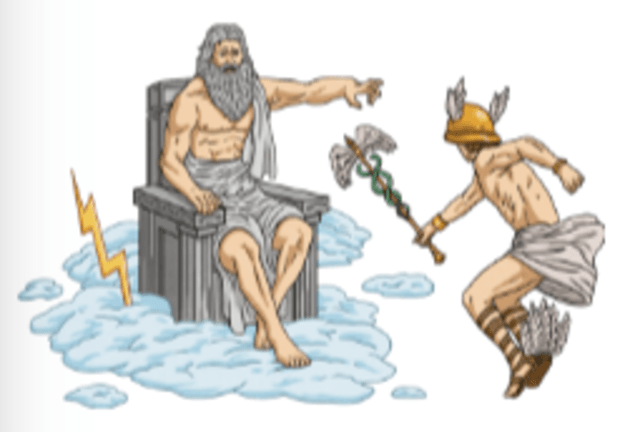 Zeus fills a similar role to Jupiter in the Ancient Roman pantheon of gods, and the two are considered equatable. Zeus is also occasionally conflated with the Hellenic sun god Helios, due to the connection that both gods have to the sun. The sun is sometimes referred to as the 'eye of Zeus'.
Zeus fills a similar role to Jupiter in the Ancient Roman pantheon of gods, and the two are considered equatable. Zeus is also occasionally conflated with the Hellenic sun god Helios, due to the connection that both gods have to the sun. The sun is sometimes referred to as the 'eye of Zeus'.
Two other gods that are somewhat equatable to Zeus are Poseidon and Hades, brothers of Zeus. Poseidon was the god of the seas, and Hades was the god of the underworld. Both of these gods had similar power to Zeus, but of them Zeus was ultimately the strongest. However, the three kept a balance of power to ensure that there would be no infighting among the gods.
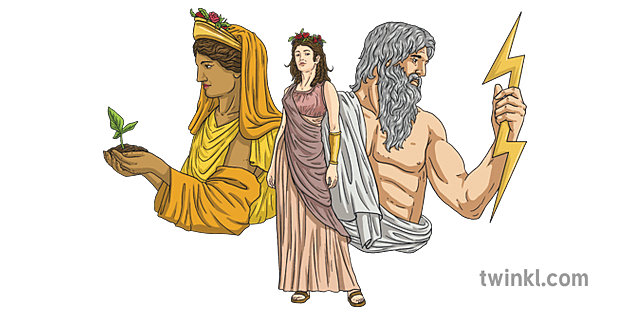 Zeus has many children. There include:
Zeus has many children. There include:
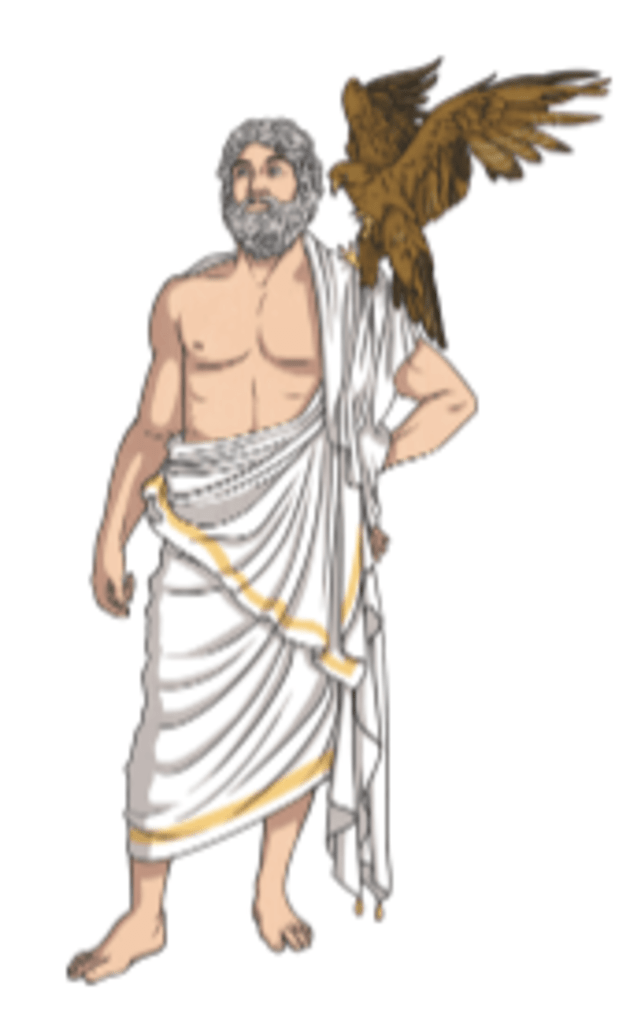 Zeus holds many titles in Ancient Greek mythology, which symbolise his power. Examples of these include:
Zeus holds many titles in Ancient Greek mythology, which symbolise his power. Examples of these include:
We know about Zeus and other Ancient Greek myths because the stories have been preserved in Greek literature, and they have also been represented in various forms of art, including statues and portraits. In 700 BC, the poet Hesiod's Theogony provided an 'origin story' for the Greek gods, and the other myths and legends tell stories set at various points in the past relative to the Ancient Greek civilisation.
From these stories, historians have been able to deduce Zeus' role as the king of the gods in the Ancient Greek pantheon, while also understanding the mythological story of how Zeus came to power. One of the main reasons why the Greek myths and legends have survived is that many of them contain real morals and life lessons that are relevant today, and this is true of the myths and legends that include Zeus.
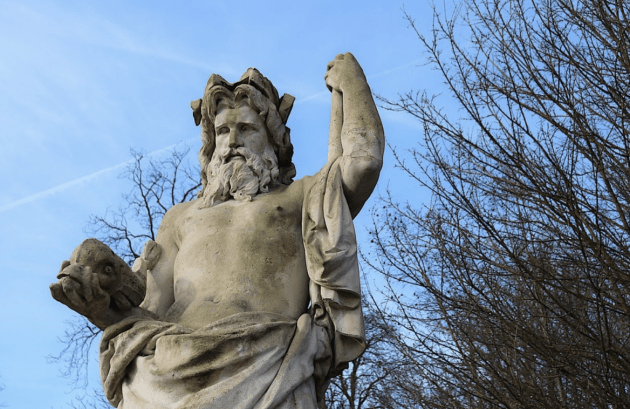 In the modern era, hundreds of thousands of people from all walks of life worship the Ancient Greek gods. Some worship the old gods for cultural reasons, such as Greek people who want to be closer to the ancient traditions of their country, and others worship the Ancient Greek gods for new age or environmentalist purposes.
In the modern era, hundreds of thousands of people from all walks of life worship the Ancient Greek gods. Some worship the old gods for cultural reasons, such as Greek people who want to be closer to the ancient traditions of their country, and others worship the Ancient Greek gods for new age or environmentalist purposes.
If you are teaching a lesson covering the topic of Zeus, there are lots of resources that are available to download, which you can use in your lesson plan. For example, this How Zeus Became King of the Gods Story resource is ideal to use for a lesson plan designed to help students learn more about Zeus. This resource has been designed to be easily printable on A4 paper, and you can also download it to your mobile device. This resource can also be downloaded to use at home.
You can also download this Greek God Fact File resource. This fact file contains lots of information about Zeus, including the powers of Zeus, Zeus' children, and some of the story of Zeus. This resource features full-colour illustrations and clear, easy-to-read text making it ideal to download and include in a lesson plan covering the topic of Zeus and the other Ancient Greek gods. All of these resources are ideal to use in a lesson plan if you are teaching your students about the Ancient Greek gods, particularly Zeus.